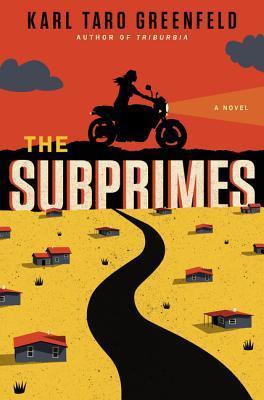What do you think?
Rate this book


320 pages, Hardcover
First published May 5, 2015
tl;dr: This story depicts a world three elections from now, when the elites have finally bought everything and the world is going to hell. While its skewerings of capitalist excesses and liberal paranoias are both spot-on, the solution it offers is beyond anyone's means. Even the characters in the novel aren't sure what happened, or why.
In a future America that feels increasingly familiar, you are your credit score. Extreme wealth inequality has created a class of have-nothings: Subprimes. Their bad credit ratings make them unemployable. Jobless and without assets, they’ve walked out on mortgages, been foreclosed upon, or can no longer afford a fixed address. Fugitives who must keep moving to avoid arrest, they wander the globally warmed American wasteland searching for day labor and a place to park their battered SUVs for the night.
Karl Taro Greenfeld’s trenchant satire follows the fortunes of two families whose lives reflect this new dog-eat-dog, survival-of-the-financially-fittest America. Desperate for work and food, a Subprime family has been forced to migrate east, hoping for a better life. They are soon joined in their odyssey by a writer and his family—slightly better off, yet falling fast. Eventually, they discover a small settlement of Subprimes who have begun an agrarian utopia built on a foreclosed exurb. Soon, though, the little stability they have is threatened when their land is targeted by job creators for shale oil extraction.
But all is not lost. A hero emerges, a woman on a motorcycle—suspiciously lacking a credit score—who just may save the world.
In The Subprimes, Karl Taro Greenfeld turns his keen and unflinching eye to our country today—and where we may be headed. The result is a novel for the 99 percent: a darkly funny comedy about paradise lost and found, the value of credit, economic policy, and the meaning of family.